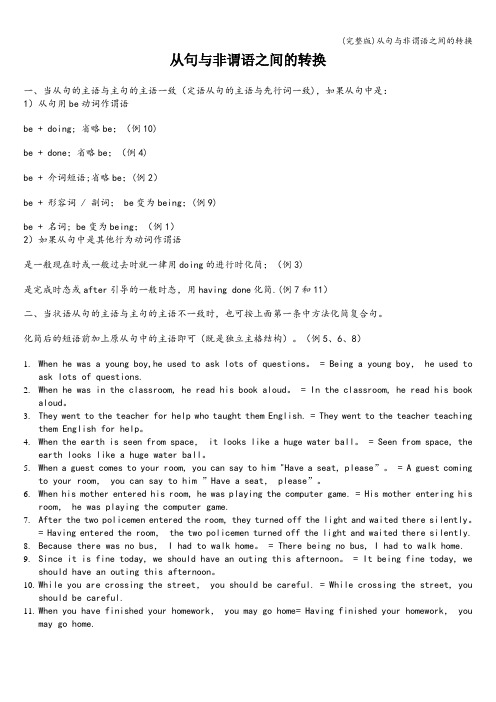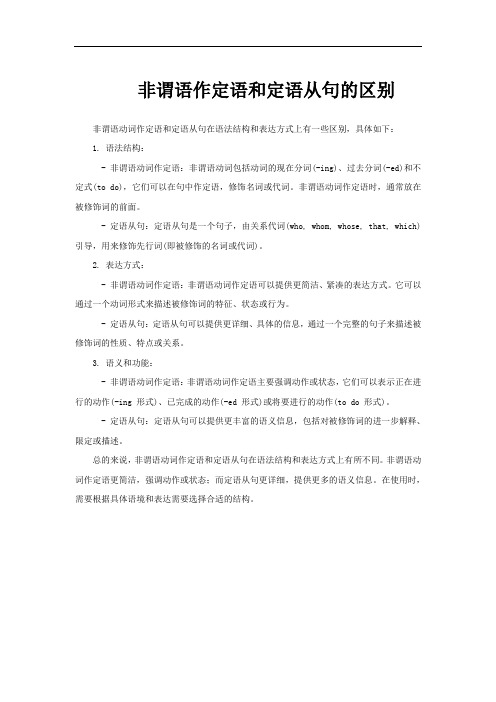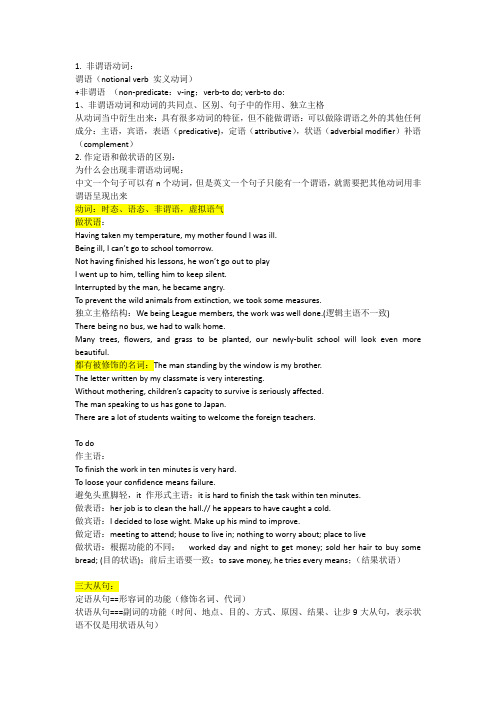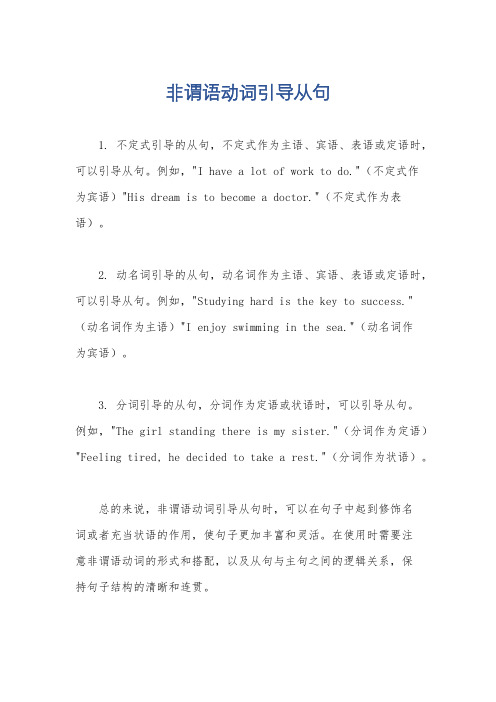非谓语动词与从句
非谓语动词与状语从句的转化

非谓语动词与状语从句的转化非谓语动词与状语从句的转化状语从句是同学们在初中就掌握的内容,笔者现将非谓语动词与状语从句之间转换的规律作一归纳,帮助大家更好地掌握非谓语动词。
一、非谓语动词与时间状语从句间的转换。
1.当主、从句的主语一致,主、从句的谓语动作同时或几乎同时发生时,且从句中谓语动词是主动语态,可用现在分词的一般式转换。
如:When they heard the news,they jumped with joy.Hearing the news,they jumped with joy.当他们听到这则消息时, 高兴得跳了起来。
2.当主、从句的主语一致,从句中的动作发生在主句的动作之前或从句中谓语动词是完成时,可用现在分词的完成式转换。
如:After he(had)returned home,he began to work.Having returned home,he began to work.回到家以后, 他开始工作。
3.当主、从句主语一致时,由after,before,since,assoon as 等引导的从句可分别用after/before/since/on 加动名词短语转换。
如:Since I saw you last,Ihavebeen ill.Since seeing you last,Ihavebeen ill.自从我上次见你后, 就一直在生病。
As soon as he heard this,he couldn’t help crying.On hearing this,he couldn’t help cr ying.他一听到这事, 不禁哭了起来。
4.当主、从句主语一致时,以when,while 引导的从句,也可用when /while加现在分词短语转换。
如While we were walking alongtheriver, weheard someoneshouting.While walking along the river,we heard someone shouting.当我们正沿着河走时,我们听到有人喊叫。
非谓语动词和从句的转换

II. V-ed形式与从句之间的转换
1. v-ed形式作定语可换成定语从句
The question discussed yesterday is very important.
The question that / which was discussed yesterday is very important.
非
非
谓
谓
语
语
动
动
词
词
与
与
从
从
句
句
间
间
的
的
转
转
换
换
一、什么叫做非谓语动词
在英语中,动词按其在句子中的作用,可分为: 谓语动词和非谓语动词。 谓语动词就是可以单独直接在句子中做谓语的动词。 非谓语动词就是不能单独在句子中做谓语的动词。
二、非谓语动词的表现形式有:
不定式 (to do) 现在分词 (doing) 过去分词 (done) 动名词 (doing)
1. 时间状语:可改为时间状语从句,也可在分词前加上 连词“when , while , until”等,使其时间意义更 明确。(多置于句首,也可置于句末)
2. 原因状语:可改为原因状语从句或并列结构。(多置于 句首或句末,也可置于句中)
3. 条件状语:可加连词if , unless 等;也可换成条件 状语从句。(多置于句首)
Tom's knowing English helps him in learning French.
That Tom knows English helps him in learning English Her being out of work was unexpected.
(完整版)从句与非谓语之间的转换

从句与非谓语之间的转换一、当从句的主语与主句的主语一致(定语从句的主语与先行词一致),如果从句中是:1)从句用be动词作谓语be + doing; 省略be;(例10)be + done;省略be;(例4)be + 介词短语;省略be;(例2)be + 形容词 / 副词; be变为being;(例9)be + 名词; be变为being;(例1)2)如果从句中是其他行为动词作谓语是一般现在时或一般过去时就一律用doing的进行时化简;(例3)是完成时态或after引导的一般时态,用having done化简.(例7和11)二、当状语从句的主语与主句的主语不一致时,也可按上面第一条中方法化简复合句。
化简后的短语前加上原从句中的主语即可(既是独立主格结构)。
(例5、6、8)1.When he was a young boy,he used to ask lots of questions。
= Being a young boy, he used toask lots of questions.2.When he was in the classroom, he read his book aloud。
= In the classroom, he read his bookaloud。
3.They went to the teacher for help who taught them English. = They went to the teacher teachingthem English for help。
4.When the earth is seen from space, it looks like a huge water ball。
= Seen from space, theearth looks like a huge water ball。
5.When a guest comes to your room, you can say to him "H ave a seat, please”。
非谓语动词与从句的转换

知识讲解知识点1:不定式〔短语〕与从句的关系1.【考查点】:不定式〔短语〕在句中作主语,其功能相当于一个主语从句,因此二者之间可以转换。
(1).To be able to help you is really an honor.(=That I’m able to help you)(2).He seemed to know the way.(=It seemed that he knew the way.)(3).Bush is said to have decided to attack North Korea.(= It is said that Bush has decided to attack North Korea.)..2.【考查点】:不定式〔短语〕在句中作宾语或宾补,相当于一个宾语从句(1).We still don’t know when and where to build a school.(宾语)(=when and where we should build a school)(2).I advised him to go and see the doctor.(宾补)(=that he should go and see)(3).He thought it a great pity not to have invited her. .(宾语)(=That he hadn’t invited her.).3.【考查点】:不定式〔短语〕在句中作表语.,相当于一个表语从句(1).My suggestion is for them to leave as soon as possible.(=that they should leave)(2).My chief purpose has been for them to get a good understanding. (=that they can get a good understanding).4.【考查点】:不定式〔短语〕在句中作定语.,相当于一个定语从句(1).The question will be discussed at the conference shortly to open in Beijing. (=that is shortly to open in Beijing)(2).All dead, I was the only one to grow up.(=that grew up).5.【考查点】:不定式〔短语〕在句中作目的.结果状语.,相当于一个目的.结果状语从句(1).He came to the area in order/so as to study the folk music there.(=in order/so that)(2).The lady was so excited as not to say a word.(=so excited that she couldn’t…).6.【考查点】:不定式〔短语〕在句中作原因状语.,相当于一个原因状语从句(1).I trembled to think of being punished by the boss.(=because I though of being punished by the boss)(2).We were disappointed to have lost the game.(=that we have lost the game).知识点2:动名词〔短语〕与从句的关系1.【考查点】:动名词〔短语〕在句中作主语,相当于一个主语从句(1).Your going away (=That you went away) made the professor angry.(2).Mary’s not being made monitor (=That Mary was not made monitor ) made us sad. 被动的动名词在句中作主语时一般不能省(3).Being called a fool(=That he was called a fool) hurt Bob badly..2.【考查点】:动名词〔短语〕再句中作宾语或宾补语,相当于一个宾语从句(1).I remember being taken to Beijing(=that I was taken to Beijing) when I was five.(2).He admitted having married Mary to a soldier(=that he had married Mary to a soldier)..3.【考查点】:动名词〔短语〕在句中作表语.,相当于一个表语从句(1).My duty is serving the people heart and soul.=(that I’ll serve the people heart and soul).(2).The problem is his not having prepared his lessons for the exam.=〔that he hasn’t prepared his lessons fo r the exam〕.(3).The difficulty is Mary’s being caught between the two trees.=〔that Mary is caught between the two trees〕..4.【考查点】:介词+动名词〔短语〕,相当于一个从句(1).He was afraid of being scolded by his mistake.(=that he was…)(2).He was astonished at her knowing you.(=that she knew you)(3).We heard the news of our team having won.(=that our team had won).知识点3:分词〔短语〕与从句的关系1.【考查点】:分词〔短语〕作定语,相当于一个定语从句(1).The hospital was an old building built in 1931(=that was built in 1931).(2).Do you know the girl standing over there(=who is standing over there)?(3).The man speaking to us the other day(= who spoke to us the other day) has gone to Japan..2.【考查点】:分词独立结构,相当于一个状语从句,其中伴随状语多与并列句转换(1).Weather permitting, we’ll have the match tomorrow.(=If weather permits)(2).The dark clouds having disappeared, the sun shone again.(=When the dark clouds had disappeared)(3).The monitor being ill we’d better put the meting off.(=As the monitor was ill)(4).Other things being equal(=If other things are equal), I’d b uy the black dress.(5).Given more time(=If we were given more time), we could have done it better.(6).He came back, his hands tied to his back(=his hands were tied to his back)..3.【考查点】:分词短语,相当于一个状语从句(1).On arriving(=As soon as I arrive) there, I’ll te lephone you.〔时间〕(2).(While)waiting(=While I was waiting )for the bus, I caught sight of her.〔时间〕(3).Educated(=As he was educated ) by the party, he became a great fighter.〔原因〕(4).Not having received(=Because I hadn’t received an answer, I wrote to him again.〔原因〕(5).(If) given(=If we had been given )enough time, e could have done it better.〔条件〕(6).(Though) having made(=Though he had made) great achievements, he didn’t pride.(让步).4.【考查点】:分词短语作状语,可表伴随,结果,相当于and 的并列句,也可和with 转换(1).He died, leaving his daughter much money.(=and left)(2).The teacher entered the lab, followed by our students.(=and he was followed by our students =with us following him=and we followed him).5.【考查点】:分词短语在句中作宾语或宾语补足语,相当于一个宾语从句(1).He found the windows broken.(=He found that the windows were broken.)(2).I felt my heart beating fast at the news of bomb explosion.(=I felt that my heart was besting fast at the news of bomb explosion).知识点4:特殊转换1.【考查点】:动名词复合结构相当于从句(1).Sophia’s having seen them(=That Sophia had seen them) didn’t surprised us.(2).I can’t bear his (him) staying up so late(=that he stays up so late).(3).We encourage students’ living in the school(=that students live in the school).(4).What was disappointing was our not being able to go for a picnic (that we were not able to go for a picnic)..2.【考查点】:there+being+其他成分(1).There being nothing to do, we played games.(=Because there was nothing to do) (原因)(2).They closed the store, there being no customers.(=Because ther was no customers) (原因).四、例题精析【例题1】Everyone in our class was working hard and doing what we could _______ a good college.A. enterB. to enterC. enteringD. entered【答案】B【解析】容易误选A。
从句与非谓语动词之间的转换

从句与非谓语动词之间的转换非谓语动词和从句可以相互转换,那么如何将复合句改为简单句呢?首先,需要分清主从复合句,然后取消从句,一般要把引导从句的连词去掉。
例如,将"When he was waiting for the bus。
he saw a dog"改为"Waiting for the bus。
he saw a dog"。
其次,如果从句的谓语动词是主动式,就要把谓语动词改为现在分词;如果从句的谓语动词是被动式,就要把谓语动词改为过去分词,并且要注意时态的变化。
例如,将"After he had finished his homework。
he went home"改为"Having finished his homework。
he went home"。
另外,使用分词短语作状语时,它逻辑上的主语必须与句子的主语一致。
如果主从句的主语不一致,在取消掉从句变为-ing或-ed形式时,要把从句的主语保留,其它部分和以前的改法一样。
例如,将"As it was hot。
we went swimming"改为"It being hot。
we went swimming"。
需要注意的是,在使用分词短语作状语时,它也可以有自己独立的逻辑上的主语,这种结构称为独立主格结构。
在很多情况下,它都表示一种伴随的动作或表示一种原因。
例如:1.If the weather allows。
I will go there.2.After the rain ped。
XXX.3.His XXX。
and he prepared to return to his institute.4.With so many comrades absent。
XXX.From the above examples。
we can see that the present participle (-ing) usually indicates an n that is happening at the same time as the main verb in the sentence。
非谓语动词与从句

非谓语动词相关从句非谓语动词概述:非谓语动词与名词性从句非谓语动词与定语从句非谓语动词与状语从句There are some people insisting that they shouldn’t learn English.非谓语动词概述:动名词Ving;现在分词Ving; 过去分词ved; to do不定式分词短语从本质上而言:是由动词派生而来的形容词。
如,a sleeping baby, a used car, a frightening experience, a frightened child, etc.A baby who is sleeping.A car which is usedving形式由动词的主动形式派生而来;表示主动的动作或正在进行的动作Ved形式由动词的被动形式派生而来:表示被动的动作或已完成的动作The fallen leavesThe falling leavesThe custom fascinates me.The fascinating custom has been the subject of many books.The baby will sleep until eight.Try not to wake a sleeping baby.Some movies are rated X.Children shouldn’t see X-rated movies. My leg was broken in three places.My broken leg is healing slowly.The sinking ship= the ship that was sinking The sunken ship=the ship that has sunken. Falling leaves=Fallen leaves=现在分词的完成时态:表示分词的动作发生在主句谓语动词动作之前。
(完整版)非谓语动词和从句的转换

非谓语动词和从句的转换----一.不定式(短语)与从句的关系1.不定式(短语)在句中作主语,其功能相当于一个主语从句,因此二者之间可以转换。
(1).To be able to help you is really an honor.(=That I’m able to help you)(2).He seemed to know the way.(=It seemed that he knew the way.)(3).Bush is said to have decided to attack North Korea.(= It is said that Bush has decided to attack North Korea.)2.不定式(短语)在句中作宾语或宾补,相当于一个宾语从句(1).We still don’t know when and where to build a school.(宾语)(=when and where we should build a school)(2).I advised him to go and see the doctor.(宾补)(=that he should go and see)(3).He thought it a great pity not to have invited her. .(宾语)(=That he hadn’t invited her.)3不定式(短语)在句中作表语.,相当于一个表语从句(1).My suggestion is for them to leave as soon as possible.(=that they should leave)(2).My chief purpose has been for them to get a good understanding.(=that they can get a good understanding)4.不定式(短语)在句中作定语.,相当于一个定语从句(1).The question will be discussed at the conference shortly to open in Beijing.(=that is shortly to open in Beijing)(2).All dead, I was the only one to grow up. (=that grew up)5.不定式(短语)在句中作目的.结果状语.,相当于一个目的.结果状语从句(1).He came to the area in order/so as to study the folk music there.(=in order/so that)(2).The lady was so excited as not to say a word.(=so excited that she could n’t…)7.不定式(短语)在句中作原因状语.,相当于一个原因状语从句(1)I trembled to think of being punished by the boss.(=because I though of being punished by the boss)(2).We were disappointed to have lost the game.(=that we have lost the game)二.动名词(短语)与从句的关系1. 动名词(短语)在句中作主语,相当于一个主语从句(1).Your going away (=That you went away) made the professor angry.(2).Mary’s not being made monitor (=That Mary was not made monitor ) made us sad.被动的动名词在句中作主语时一般不能省(3).Being called a fool(=That he was called a fool) hurt Bob badly.2. 动名词(短语)在句中作宾语或宾补语,相当于一个宾语从句(1).I remember being taken to Beijing(=that I was taken to Beijing) when I was five.(2).He admitted having married Mary to a soldier(=that he had married Mary to a soldier).3.动名词(短语)在句中作表语.,相当于一个表语从句(1).My duty is serving the people heart and soul (that I’ll serve the people heart and soul).(2).The problem is his not having prepared his lessons for the exam(=that he hasn’t prepared his lessons for the exam)(3).The difficulty is Mary’s being caught between the two trees(=that Mary is caught between the two trees).4.介词+动名词(短语),相当于一个从句(宾语从句或同位语从句 0(1)He was afraid of being scolded by his mistake.(=that he was…)(2).He was astonished at her knowing you.(=that she knew you)(3).We heard the news of our team having won.(=that our team had won)三.分词(短语)与从句的关系1.分词(短语)作定语,相当于一个定语从句(1)The hospital was an old building built in 1931(=that was built in 1931).(2).Do you know the girl standing over there(=who is standing over there)?(3).The man speaking to us the other day(= who spoke to us the other day) has gone to Japan.本节值得注意的问题:现在分词短语作定语时,所表示的动作不能先于谓语所表示的动作,也不可以表示将来。
非谓语动词和从句的转换优秀课件

一、什么叫做非谓语动词
在英语中,动词按其在句子中的作用,可分为: 谓语动词和非谓语动词。 谓语动词就是可以单独直接在句子中做谓语的动词。 非谓语动词就是不能单独在句子中做谓语的动词。
二、非谓语动词的表现形式有:
不定式 (to do) 现在分词 (doing) 过去分词 (done) 动名词 (doing)
1. 时间状语:可改为时间状语从句,也可在分词前加上 连词“when , while , until”等,使其时间意义更 明确。(多置于句首,也可置于句末)
2. 原因状语:可改为原因状语从句或并列结构。(多置于 句首或句末,也可置于句中)
3. 条件状语:可加连词if , unless 等;也可换成条件 状语从句。(多置于句首)
If we weIrfegGgiivviveeennn more time , we could do it much better .
He was Wwarned of the danger, bhuet he still went skating on the ice.
但是,有些分词作状语是独立结构,不与句子的主语 产生联系;常见的有:judging from, generally
While waiting at the dentist’s, I read the whole of a short story. (=While I was waiting … ) Before being in the army, he was an engineer.
(= Before he was in the army, …) __H_av_in_g__fi_ni_sh_e_d__(finish) my work, I went to
非谓语动词和从句

有fionrisnhoetd, t必he须w用orwk.hether
He doesn’t know whether they will plant
注tr意ees:从on句S用atu正rd常ay的o陈r n述ot句. 语序.
主句是过去时, 从句是过去性质时态
妈妈在洗衣服的时候,爸爸在看报纸。
My mum _w_a_s_d_o_i_ng__s_o_m_e_w_a_s_h_i_ng____
_w__h_il_e_ dad _w_a_s_r_e_a_d_in_g__ne_w_s_p_a_p_e_rs.
他去上班时,一边开车一边听音乐。
He is listening to music w__hi_le__ he _is__d_r_iv_in_g__to__w.ork
Sb + be + adj. + to do sth
5. 制止这些捕杀很艰难. __I_t_ is hard _to__s_t_op___ the killing.
6.它们的水常常不宜饮用,因为我们给污染了.
Their water isn’t g_o_o__d__ _t_o__d_r_i_n_k___. because we’ve __m_a_d__e__ _i_t__ d__ir_t_y_. 7. 很多人决定不考虑这些. Many peopled_e_c_id_ e__n_o_t _tothink about it. 8. 很多动物无处生存.
tell sb (not) to do agree to do stop to do
即可用动名词,也可用动词不定式作宾语的:
停止正做的事情 stop doing sth 停止正做的事情去做另一件事 stop to do sth (还没做)记得要做某事 remember to do sth 记得做过某事(已经做)remember doing sth 忘记去做某事 forget to do sth 忘记做过某事 forget doing sth
非谓语动词&从句

非谓语动词非谓语动词(不能作谓语用)包括不定式、分词及动名词。
一、动词不定式1.常用形式:一般主动式to do, 一般被动式to be done完成主动式to have done, 完成被动式to have been done进行式to be doing不定式的时态形式所表示的时间关系:1)一般式:表示的动作和谓语动词所表示的动作同时发生,或在谓语动作之后,或没有时间限制。
例如:They often watch us play table tennis.(与谓语动作同时)She hopes to go there again.(在谓语动作之后)It is necessary and important to read English every day.(无时间限制)The factory to make radios is over there.(无时间限制)m sorry to have kept you waiting.2)完成式:表示的动作在谓语动词所表示的动作之前。
如:I /She seems to have been a teacher for many years.3)进行式:表示正在发生的动作且与谓语动作同时发生。
例如:She happened to be writing a letter in the room when I come in.注:不定式的被动式:名词、代词为不定式的逻辑宾语时,一般用不定式被动式,例如:What is to be done is unknown. /The bridge to be bulit there is very long.不定式的否定式 not to do2.语法功能:可作主语、表语、宾语、宾补、定语和状语(即除谓语之外的各种成分)。
例如:1)主语:To master a foreign language is very important.2)表语:My job is to drive them to the company every day.3)宾语:Do you want to visit the Great Wall?Can you give us some advice on what to do next?4)宾补:The teacher advised us to have a rest first.I didn’t notice them come in.注:see, hear, watch, notice, have, make, let等动词后作宾补的动词不定式不带to, 但变为被动语态以后(即不定式作主补时)要带to,其中let sb. do sth. 变为被动式为sb. is let do sth. help(帮助)后作宾补的动词不定式可带to,也可不带to. 即help sb.(to)do sth.5)不定式作定语:作后置定语,位于被修饰词后如:Who was the first one to get to the top of the hill yesterday?He is the man to depend on/to believe in.不定式作定语,与被其修饰的词可构成逻辑上的以下关系:a.动宾关系 e.g. I have a lot of work to do.b.主谓关系 e.g. He is always the first to help me.c.其它关系(多为固定搭配) e.g. tell me a way to solve the problem.6)状语: in order toA.目的状语:She reads China Daily every day so as to improve her English.to注:in order to 可以位于句首或句中,so as to 不能位于句首。
非谓语作定语和定语从句的区别

非谓语作定语和定语从句的区别
非谓语动词作定语和定语从句在语法结构和表达方式上有一些区别,具体如下:
1. 语法结构:
- 非谓语动词作定语:非谓语动词包括动词的现在分词(-ing)、过去分词(-ed)和不定式(to do),它们可以在句中作定语,修饰名词或代词。
非谓语动词作定语时,通常放在被修饰词的前面。
- 定语从句:定语从句是一个句子,由关系代词(who, whom, whose, that, which)引导,用来修饰先行词(即被修饰的名词或代词)。
2. 表达方式:
- 非谓语动词作定语:非谓语动词作定语可以提供更简洁、紧凑的表达方式。
它可以通过一个动词形式来描述被修饰词的特征、状态或行为。
- 定语从句:定语从句可以提供更详细、具体的信息,通过一个完整的句子来描述被修饰词的性质、特点或关系。
3. 语义和功能:
- 非谓语动词作定语:非谓语动词作定语主要强调动作或状态,它们可以表示正在进行的动作(-ing 形式)、已完成的动作(-ed 形式)或将要进行的动作(to do 形式)。
- 定语从句:定语从句可以提供更丰富的语义信息,包括对被修饰词的进一步解释、限定或描述。
总的来说,非谓语动词作定语和定语从句在语法结构和表达方式上有所不同。
非谓语动词作定语更简洁,强调动作或状态;而定语从句更详细,提供更多的语义信息。
在使用时,需要根据具体语境和表达需要选择合适的结构。
非谓语动词语与从句的关系课件

条件状语从句转换为非谓语动词
条件状语从句
注意事项
表示动作发生的条件,如"if"、 "unless"、"provided that"等。
非谓语动词表示的动作应是主句动作 的条件或假设。
转换方法
将条件状语从句转换为非谓语动词, 如"If possible, we will go to the park tomorrow."(如果可能的话, 我们明天会去公园。)
02
非谓语动词在句子中可以作为主 语、宾语、表语、定语、状语和 补足语。
分类:不定式、动名词、分词
01
不定式
表示未发生的动作或行为,常用于表示目的、结果或条件。不定式可以
作为主语、宾语、表语和定语。
02
动名词
表示正在进行的动作或行为,常用于表示进行时态。动名词可以作为主
语、宾语和表语。
03
分词
表示完成的动作或行为,分为现在分词和过去分词。现在分词表示正在
THANKS
感谢观看
时间状语从句
表示动作发生的时间,如"when" 、"before"、"after"、"while"等
。
转换方法
将时间状语从句转换为非谓语动词 ,如"Having finished his homework, he went to bed."( 完成作业后,他上床睡觉了。)
注意事项
非谓语动词表示的动作应在主句动 作之前发生。
进行的动作或行为,过去分词表示已经完成的动作或行为。分词可以作
为定语、状语和补足语。
02
非,但通常放在句末,以强调其动作 或状态。
重要知识点解析非谓语动词与名词性从句的区别与应用

重要知识点解析非谓语动词与名词性从句的区别与应用在英语语法中,非谓语动词和名词性从句是两个重要的概念。
它们在句子中起着不同的作用,因此了解它们的区别和应用是学习英语的关键。
本文将对非谓语动词和名词性从句进行解析,明确它们的区别并探讨其应用。
一、非谓语动词的定义和特点非谓语动词是指在句子中充当动词,但不是谓语动词的形式。
在英语中,非谓语动词包括动词不定式、动名词和现在分词。
它们的共同特点是能够作为动词的补语或修饰语,并且带有动词的特点和功能。
动词不定式是非谓语动词的一种形式,通常由"to"加上动词原形构成。
例如:"to eat"(吃)、"to play"(玩)等。
动名词是以动词的现在分词形式构成的非谓语动词。
例如:"swimming"(游泳)、"reading"(阅读)等。
现在分词也是非谓语动词的一种形式,一般以-ing结尾。
例如:"running"(跑步)、"dancing"(跳舞)等。
二、名词性从句的定义和特点名词性从句是指在句子中充当名词的从句。
名词性从句可以作为主语、宾语、表语或同位语等主要成分出现在句子中,具有名词的性质和功能。
名词性从句有三种形式:宾语从句、主语从句和表语从句。
宾语从句通常作为动词的宾语出现在句子中。
例如:"I believe that you can do it."(我相信你能做到)主语从句作为句子的主语出现,通常紧跟在句子的开头。
例如:"That she is late is not surprising."(她迟到了并不奇怪)表语从句充当句子的表语,说明主语的身份、性质或状态。
例如:"My dream is that I can travel around the world."(我的梦想是能够环游世界)三、非谓语动词与名词性从句的区别虽然非谓语动词和名词性从句都可以充当句子中的主要成分,并且具有名词的性质和功能,但它们在用法和结构上存在一些区别。
非谓语动词及从句转换

=so as not to lose his job.
非谓语动词和从句的转换
I. v-ing 形式与从句之间的转换
1. v-ing形式作主语可换成that引导的主语从句
2. v-ing形式作宾语或宾补可换成that 引导的宾语从句
I remember having paid him for his work.
I remember that I have paid him for his work. He suggests our making better use of the school library.
We will study in the house facing south.
We will study in the house that / which faces south. The man talking to my teacher is my father.
The man who / that is talking to my teacher is my father.
While waiting at the dentist’s, I read the whole of a short story. (=While I was waiting … ) Before being in the army, he was an engineer.
(= Before he was in the army, …) __H_av_in_g__fi_ni_sh_e_d__(finish) my work, I went to
非谓语和定语从句

1. 非谓语动词:谓语(notional verb 实义动词)+非谓语(non-predicate:v-ing;verb-to do; verb-to do:1、非谓语动词和动词的共同点、区别、句子中的作用、独立主格从动词当中衍生出来:具有很多动词的特征,但不能做谓语:可以做除谓语之外的其他任何成分:主语,宾语,表语(predicative),定语(attributive),状语(adverbial modifier)补语(complement)2.作定语和做状语的区别:为什么会出现非谓语动词呢:中文一个句子可以有n个动词,但是英文一个句子只能有一个谓语,就需要把其他动词用非谓语呈现出来动词:时态、语态、非谓语,虚拟语气做状语:Having taken my temperature, my mother found I was ill.Being ill, I can’t go to school tomorrow.Not having finished his lessons, he won’t go out to playI went up to him, telling him to keep silent.Interrupted by the man, he became angry.To prevent the wild animals from extinction, we took some measures.独立主格结构:We being League members, the work was well done.(逻辑主语不一致)There being no bus, we had to walk home.Many trees, flowers, and grass to be planted, our newly-bulit school will look even more beautiful.都有被修饰的名词:The man standing by the window is my brother.The letter written by my classmate is very interesting.Without mothering, children’s capacity to survive is seriously affected.The man speaking to us has gone to Japan.There are a lot of students waiting to welcome the foreign teachers.To do作主语:To finish the work in ten minutes is very hard.To loose your confidence means failure.避免头重脚轻,it 作形式主语:it is hard to finish the task within ten minutes.做表语:her job is to clean the hall.// he appears to have caught a cold.做宾语:I decided to lose wight. Make up his mind to improve.做定语:meeting to attend; house to live in; nothing to worry about; place to live做状语:根据功能的不同;worked day and night to get money; sold her hair to buy some bread; (目的状语);前后主语要一致;to save money, he tries every means;(结果状语)三大从句:定语从句==形容词的功能(修饰名词、代词)状语从句===副词的功能(时间、地点、目的、方式、原因、结果、让步9大从句,表示状语不仅是用状语从句)名词性从句===名词的功能(主语、宾语、表语、同位语从句)定语从句:1. 什么叫做定从,修饰名词或代词的从句。
非谓语动词引导从句

非谓语动词引导从句
1. 不定式引导的从句,不定式作为主语、宾语、表语或定语时,可以引导从句。
例如,"I have a lot of work to do."(不定式作
为宾语)"His dream is to become a doctor."(不定式作为表语)。
2. 动名词引导的从句,动名词作为主语、宾语、表语或定语时,可以引导从句。
例如,"Studying hard is the key to success."(动名词作为主语)"I enjoy swimming in the sea."(动名词作
为宾语)。
3. 分词引导的从句,分词作为定语或状语时,可以引导从句。
例如,"The girl standing there is my sister."(分词作为定语)"Feeling tired, he decided to take a rest."(分词作为状语)。
总的来说,非谓语动词引导从句时,可以在句子中起到修饰名
词或者充当状语的作用,使句子更加丰富和灵活。
在使用时需要注
意非谓语动词的形式和搭配,以及从句与主句之间的逻辑关系,保
持句子结构的清晰和连贯。
- 1、下载文档前请自行甄别文档内容的完整性,平台不提供额外的编辑、内容补充、找答案等附加服务。
- 2、"仅部分预览"的文档,不可在线预览部分如存在完整性等问题,可反馈申请退款(可完整预览的文档不适用该条件!)。
- 3、如文档侵犯您的权益,请联系客服反馈,我们会尽快为您处理(人工客服工作时间:9:00-18:30)。
